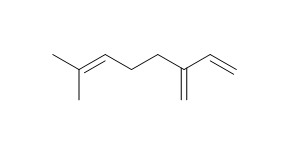Myrcene
Myrcene is a precursor of pheromones in Ips beetles. Myrcene presents sedative as well as motor relaxant effects.
Inquire / Order:
manager@chemfaces.com
Technical Inquiries:
service@chemfaces.com
Tel:
+86-27-84237783
Fax:
+86-27-84254680
Address:
1 Building, No. 83, CheCheng Rd., Wuhan Economic and Technological Development Zone, Wuhan, Hubei 430056, PRC
Providing storage is as stated on the product vial and the vial is kept tightly sealed, the product can be stored for up to
24 months(2-8C).
Wherever possible, you should prepare and use solutions on the same day. However, if you need to make up stock solutions in advance, we recommend that you store the solution as aliquots in tightly sealed vials at -20C. Generally, these will be useable for up to two weeks. Before use, and prior to opening the vial we recommend that you allow your product to equilibrate to room temperature for at least 1 hour.
Need more advice on solubility, usage and handling? Please email to: service@chemfaces.com
The packaging of the product may have turned upside down during transportation, resulting in the natural compounds adhering to the neck or cap of the vial. take the vial out of its packaging and gently shake to let the compounds fall to the bottom of the vial. for liquid products, centrifuge at 200-500 RPM to gather the liquid at the bottom of the vial. try to avoid loss or contamination during handling.
J Mol Med (Berl).2018, 96(7):661-672
Asian J Beauty Cosmetol2024, 22(1): 103-112.
Dermatologica Sinica2024, 42(1):p19-30.
Kyung Hee University2024, 4789969.
Front Plant Sci.2021, 12: 648426.
Current Analytical Chemistry2024, 20(8):599-610.
Evid Based Complement Alternat Med.2021, 2021:8847358.
Faculty of Chem. & Nat. Resource Eng.2014, 62
BioRxiv-The Preprint server for biology2023, 586957.
Food Research2021, 5(1):65-71
Related and Featured Products
Phytomedicine, 2002, 9(8):709-714.
Central effects of citral, myrcene and limonene, constituents of essential oil chemotypes from Lippia alba (Mill.) N.E. Brown.[Reference:
WebLink]
METHODS AND RESULTS:
Citral, Myrcene and limonene (100 and 200 mg/kg body wt., i.p.), constituents of essential oils from Lippia alba chemotypes, decreased not only the number of crossings but also numbers for rearing and grooming, as measured by the open-field test in mice. Although muscle relaxation detected by the rota rod test was seen only at the highest doses of citral (200 mg/kg body wt.) and Myrcene (100 and 200 mg/kg body wt.), this effect was observed even at the lowest dose of limonene (50 mg/kg body wt.). Also, citral and Myrcene (100 and 200 mg/kg body wt.) increased barbiturate sleeping time as compared to control. Limonene was also effective at the highest dose, and although citral did not increase the onset of sleep, it increased the duration of sleep, which is indicative of a potentiation of sleeping time. Citral (100 and 200 mg/kg body wt.) increased 2.3 and 3.5 times, respectively, the barbiturate sleeping time in mice. Similar effects were observed for Myrcene and limonene at the highest dose (200 mg/kg body wt.) which increased the sleeping time around 2.6 times. In the elevated-plus maze, no effect was detected with citral up to 25 mg/kg body wt., while at a high dose it decreased by 46% the number of entries in the open arms. Asmaller but significant effect was detected with limonene (5 mg/kg body wt.). While Myrcene (10 mg/kg body wt.) decreased only by 22% the number of entries in the open arms, this parameter was decreased by 48% at the highest dose.
CONCLUSIONS:
Our study showed that citral, limonene and Myrcene presented sedative as well as motor relaxant effects. Although only at the highest dose, they also produced a potentiation of the pentobarbital-induced sleeping time in mice, which was more intense in the presence of citral. In addition, neither of them showed an anxiolytic effect, but rather a slight anxiogenic type of effect at the higher doses.
Journal of Insect Physiology, 1974, 20(7):1271-1275.
Myrcene: A precursor of pheromones in Ips beetles.[Reference:
WebLink]
METHODS AND RESULTS:
Males of Ips spp. produced the pheromones ipsdienol (2-methyl-6-methylene-2,7-octadien-4-ol) and/or ipsenol (2-methyl-6-methylene-7-octen-4-ol) when exposed to vapours of Myrcene, a monoterpene present in their hosts ( Pinus spp.). Ips grandicollis and Ips calligraphus require feeding before metabolizing the Myrcene, whereas Ips avulsus and Ips paraconfusus produce some pheromone without prior feeding. Topical treatment with ipsdienol results in ipsenol production in both fed and unfed I. paraconfusus males but only in fed I. gradicollis males. I. calligraphus males, which do not produce ipsenol in nature, did not produce any with the topical treatment regardless of prior conditioning.
CONCLUSIONS:
It is concluded that Myrcene can serve as a precursor for these terpene alcohols and suggested that ipsenol is produced by the reduction of ipsdienol. Furthermore, the biosynthesis of these pheromones appears to be under some form of control in certain species, with the stimulus for production occurring upon feeding.



